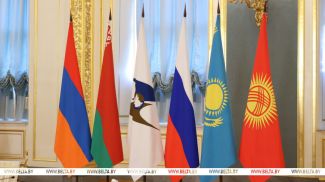MOSCOW, 1 February (BelTA) - Foreign trade of the Eurasian Economic Union decreased by 16.5% and domestic trade by 11.5% in 2020 in the wake of the pandemic of coronavirus infection and its impact, Andrei Slepnev, Member of the Board — Minister in charge of Trade of the Eurasian Economic Commission, told a briefing for the press in Moscow on 1 February, BelTA has learned.
“First of all, I would like to cite some foreign trade statistics for the past year which was a difficult one: both domestic trade and also foreign trade decreased,” Andrei Slepnev said. “The numbers vary slightly. Foreign trade plummeted by 16.5%, which was due to the high share of energy and commodities on the balance sheet. As for mutual trade, the decline was also big, 11.5%, but here the situation is a bit better."
The negative statistics on trade is mainly related to fluctuations in the prices of energy products. “If we take statistics on non-oil and gas, non-energy exports, the figures are quite different - 6.5% drop in both mutual and foreign trade,” Andrei Slepnev said. “At the same time, in physical volumes there is even growth: foreign trade with third countries rose by 3% and mutual trade by about 1%. We see a significant - more than 12% - increase in supplies of agricultural raw materials, food: it was, indeed, an important driver of growth last year. There were supplies of of new goods such as polyethylene and plastics associated. It was thanks to the launch of big processing complexes. We hope that the export structure will continue improving.”
When asked about when the trade may possibly recover, Andrei Slepnev said: "It is difficult to make such forecasts now at the beginning of the year. It is unlikely that we will make up for all the losses in 2021. It will most likely take a couple of years for international trade to recover fully. Nevertheless, we see that our enterprises have coped with the challenges as a whole and are even increasing their share in international markets in certain positions."
He also noted that the level of trade decline depends significantly on the geography of supplies. "As for the geographical structure, we also see significant differences," the EEC minister said. “For example, the trade with China fell by 6%, with the European Union - by 26%. Obviously, we need reciprocal forward-looking measures to level out these losses. Here we count on the dialogues which are currently in place between the EEC and the European Commission and also on the removal of political constraints that affect trade.”











